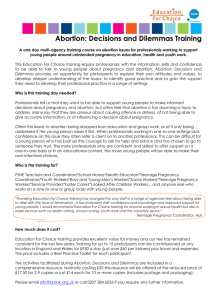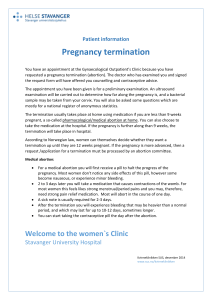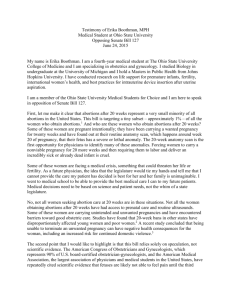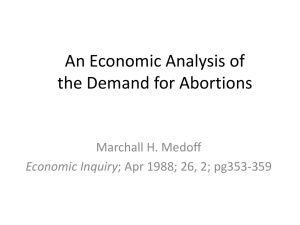singapore - the United Nations
advertisement
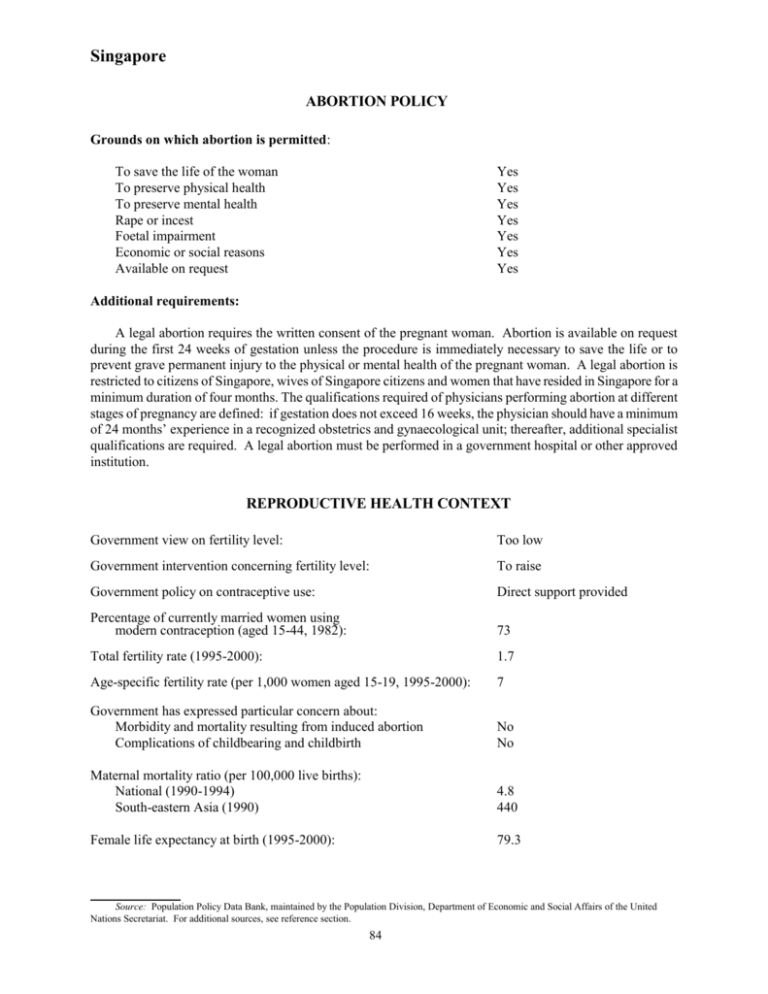
Singapore ABORTION POLICY Grounds on which abortion is permitted: To save the life of the woman To preserve physical health To preserve mental health Rape or incest Foetal impairment Economic or social reasons Available on request Yes Yes Yes Yes Yes Yes Yes Additional requirements: A legal abortion requires the written consent of the pregnant woman. Abortion is available on request during the first 24 weeks of gestation unless the procedure is immediately necessary to save the life or to prevent grave permanent injury to the physical or mental health of the pregnant woman. A legal abortion is restricted to citizens of Singapore, wives of Singapore citizens and women that have resided in Singapore for a minimum duration of four months. The qualifications required of physicians performing abortion at different stages of pregnancy are defined: if gestation does not exceed 16 weeks, the physician should have a minimum of 24 months’ experience in a recognized obstetrics and gynaecological unit; thereafter, additional specialist qualifications are required. A legal abortion must be performed in a government hospital or other approved institution. REPRODUCTIVE HEALTH CONTEXT Government view on fertility level: Too low Government intervention concerning fertility level: To raise Government policy on contraceptive use: Direct support provided Percentage of currently married women using modern contraception (aged 15-44, 1982): 73 Total fertility rate (1995-2000): 1.7 Age-specific fertility rate (per 1,000 women aged 15-19, 1995-2000): 7 Government has expressed particular concern about: Morbidity and mortality resulting from induced abortion Complications of childbearing and childbirth No No Maternal mortality ratio (per 100,000 live births): National (1990-1994) South-eastern Asia (1990) 4.8 440 Female life expectancy at birth (1995-2000): 79.3 Source: Population Policy Data Bank, maintained by the Population Division, Department of Economic and Social Affairs of the United Nations Secretariat. For additional sources, see reference section. 84 Singapore BACKGROUND Until 1969, abortion legislation in Singapore was based on British laws adopted in the nineteenth century. The performance of an abortion was in general a criminal act punishable under sections 312-316 of the Penal Code. However, an abortion was permitted if performed in good faith to preserve the life of the pregnant woman. The first legislative act designed to liberalize abortion law was enacted on 20 March 1970. The Act permitted an abortion to be performed on broad medical, eugenic, juridical and socio-economic grounds. Abortions carried out on medical or eugenic grounds could be performed during the first 24 weeks of pregnancy, while abortions performed on juridical and socio-economic grounds could be performed only during the first 16 weeks of pregnancy. In general, before an abortion was performed, it had to receive the approval of a board composed of 11 members (Termination of Pregnancy Authorization Board). Section 5(3) of the Abortion Act, however, permitted a physician to perform an abortion without the Board’s authorization if, after consulting another physician, both reached the conclusion that continuance of the pregnancy would involve serious risk to the life of the pregnant woman or serious injury to her physical or mental health. In this case, the Board was to be notified of the performance of the abortion within a two-week period. The 1970 law required the written consent of all married women regardless of their age and of unmarried women that were at least 18 years of age. The consent of parents/guardians was required for all unmarried women under age 18. The Board was authorized to consent for unmarried women under age 18 if they had no parents/guardians or were so insane or feeble-minded as to be incapable of giving a valid consent. The Abortion Act of 1974 (Penal Code, chapter 119, sections 312-316), as amended by Act No. 12 of 1980, liberalized Singapore’s abortion law further. The Act provides that a person shall not be guilty of an offence under the law relating to abortion when a pregnancy is terminated by a registered physician acting on the request of a pregnant woman and with her written consent during the first 24 weeks of pregnancy. Beyond that time, an abortion may be performed only if immediately necessary to save the life or prevent grave permanent injury to the physical or mental health of the pregnant woman. Except in cases in which an abortion is immediately necessary to save the life of the pregnant woman, she must meet certain residency or citizenship requirements. The new Act abolished the Termination of Pregnancy Authorization Board and the requirement that it consent to the performance of abortions. The 1974 Act contains a conscience clause permitting medical personnel to be excused from participating in any procedure to terminate a pregnancy, unless the procedure is immediately necessary to save the life of the pregnant woman. Violations of the Act constitute offences punishable by imprisonment and/or payment of a fine. Under the 1974 Act, a legal abortion must be performed in a government hospital or in an approved institution unless the treatment to terminate the pregnancy consists solely of the use of drugs prescribed by a registered medical practitioner. Regulations issued under the Act define the qualifications required of physicians performing an abortion at different stages of pregnancy. A medical practitioner terminating a pregnancy not exceeding 16 weeks’ duration must be registered under the Medical Regulation Act and have at least 24 months’ experience in an obstetric and gynaecological unit of a recognized hospital, while a medical Source: Population Policy Data Bank, maintained by the Population Division, Department of Economic and Social Affairs of the United Nations Secretariat. For additional sources, see reference section. 85 Singapore practitioner terminating a pregnancy of no more than 24 weeks’ duration must hold the degree of Master of Medicine (Obstetrics and Gynaecology) of the University of Singapore or the National University of Singapore or be a Member or Fellow of a Royal College of Obstetricians and Gynaecologists. The regulations also require the approval of institutions for the performance of abortions to be renewed every two years and place a duty of confidentiality on such institutions. In 1987, these regulations were amended to introduce mandatory counselling prior to and following the performance of an abortion. In addition, they require a pregnant woman to wait twenty-four hours after receiving the counselling until the abortion is performed unless performance of the abortion is immediately necessary to save the life or prevent grave permanent injury to the physical or mental health of the pregnant woman. Pre-abortion counselling is reportedly intended to provide women with information that may allow them to continue their pregnancy and post-abortion counselling to discourage them from seeking repeat abortions. In 1996 the estimated abortion rate was 15.9 abortions per 1,000 women aged 15-44 and the modern contraceptive prevalence rate was estimated most recently in 1982 at 73 per cent. The Government’s concern about below-replacement fertility has led it to implement a number of measures designed to reverse this trend. In 1986 the total fertility rate hit an all-time low of 1.4 children per woman. As a result, the Government set out in 1987 to encourage women to have at least three children: it offered new incentives in the form of tax deductions and rebates, improved maternity leave benefits, childcare subsidies and priority in housing and school registration. The total fertility rate for 1995-2000 rebounded to 1.7 children per woman. Source: Population Policy Data Bank, maintained by the Population Division, Department of Economic and Social Affairs of the United Nations Secretariat. For additional sources, see reference section. 86

